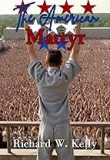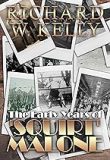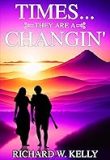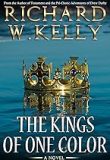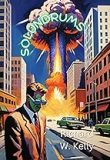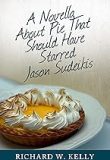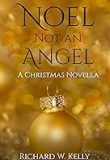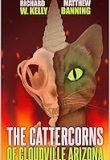Author Interview: Richard W. Kelly

The books shown on the left are by Richard W. Kelly. Click on the cover to order.
This interview was conducted by Lily Andrews on October 20, 2024.
Lilly Andrews: Congratulations on your new novel, The American Martyr. What I loved about the story is its believability. Writing conspiracy thrillers, in my view, is tricky and calls for deft imagination. How did you settle on writing a book of this genre?
Richard W. Kelly: Thank you. I am very proud of how it turned out. Genres are a strange thing to me. I think of myself as a storyteller. I like to tell stories that help people feel things. I don’t think I set out to write a thriller when I was developing this story, it just built into it. I have written quite a few different genres, Fantasy, Horror, Young Adult, Historic Fiction, Bizarro… Having read enough books and seen enough movies I think the genre of a story sort of discovers itself and then helps drive the narrative whether you want it to or not.
Lilly Andrews: You have used a young character, Brian Brample, to address key issues in society, a deflection from the norm. His resilience, courage, and valor are admirable and appreciable as well in the face of great turmoil that rocks his life. What inspired your creation of a teenager as the lead character in the story?
Richard W. Kelly: I develop stories for a long period of time. I have some stories that have been bouncing around in my head since I was in elementary school. This one started to take shape when I was in high school. Back then all my stories revolved around generally younger characters. I think introducing Brian as a sixteen-year-old kid has a lot to do with how long this has been simmering in my brain.
Lilly Andrews: Are there some parts of your book that you found challenging to write about? If yes, mention some of these scenes to us.
Richard W. Kelly: I don’t know if there were specific scenes that were hard for me, but the overall feel of the early prison section was darker than I am used to dealing with. And when I write, I think about the scenes and the development all the time. I may write for an hour or two, but I will likely be playing through the scenes in my head for the other 14 waking hours of the day. And since this book didn’t write super quick it left me dwelling on some very dark themes for much too long.
Lily Andrews: The title and cover of your book are intelligently designed and reflect the tone of the story, even going ahead to offer some thematic clues. Tell us the process of coming up with the two.
Richard W. Kelly: The title went through so many different iterations. Most of my books start without a name, it is often one of the last parts that actually comes together. For the first few months I called it my mass shooting book. I think I do that to protect myself from dropping a project. I have a few things that have gone unfinished and it is a lot easier to let go of if it doesn’t have a name. But with this one the first title I had was Finnis Mundi Mea Culpa. I think it translates into “The end of the world is my fault”. It wasn’t easy to say, didn’t roll off the tongue. I tried Adolph of Nazareth. I almost settled on King Death. But The American Martyr came to me while writing. It was actually the very last words I wrote in the book. And as soon as I wrote it, I knew that was the right title.
The cover, I knew what scene I wanted. While I’m writing, I am often visualizing the scenes like it were a movie. And as the book progresses there are different scenes that become my favorite because of the grandeur. In The American Martyr, the post-riot speech stuck with me more than any other scene.
Lily Andrews: In a world where most fictional books are written merely for escapist entertainment, I was impressed by the lessons and the moral arc your story took in an age of political depravity. Was there an expectation that you had about this on readers?
Richard W. Kelly: I actually hope this is one of the things that sets me apart from the mass of authors that are out there today. Of course, I want my books to be an escape and an experience that is far beyond most people’s lives, but the essence of my books is about the characters. Just like with real people there needs to be growth and learning and understanding. Ideally, people come away from my books, not just entertained, but feeling better about themselves, other people, and the world around them. I hope that people feel like they learn things that could affect their lives as well.
Lily Andrews: Do you have any interesting reading quirks?
Richard W. Kelly: Outside of writing, I have been an analyst for the last twenty years. And that means I am a big dork for data and reporting. I don’t think there is anything odd about how or what I read, but I do log everything I read unfailingly. I have list of every book I’ve read, when I finished, what I rated it on a ten-star scale and how it ranks among everything else I’ve ever read. So, I can go back and see what the first book (novel) I ever read was, There’s a Boy in the Girls’ Bathroom. Who I’ve read the most of, Orson Scott Card. Or even what was the best book I’ve ever read that was published in the 1970’s, Princess Bride.
Lily Andrews: Was there prior research that you did before writing this book? Take us through this process
Richard W. Kelly: I do a lot of research, but very little of it is done before hand. I spend anywhere from days to decades developing the story, but there is little to no research in that time period. Then once I start writing I will stop when I realize I don’t know something.
I think the first large portion of The American Martyr that needed research was the draft. I wrote the section where the President announces the draft and at the end of the speech I stopped writing. I realized I had no idea what it was really like. So, I went off and talked to my father, my mother, my mother-in-law. Anyone I knew who was around during the last draft. I looked up timelines of announcements to actual draft to reporting times to bootcamp. I found old draft letters, newspaper articles, and draft cards.
And this happens over and over while I write. It is a strange derailment where I spend anywhere from a few hours to a few weeks researching a specific thing. This book had lots of research subjects. Some of them were how things changed when voting age dropped to 18, how the draft worked, court system, how defendants are transported to and from court, what they can wear, difference between civil law and military law, prison, prison riots, prison layouts, the dark web, revolutionary publishers, and I’m sure there is more, those are just what comes to mind.
Lily Andrews: You have published several titles over time. On average, how long does it take you to write one novel?
Richard W. Kelly: Each novel is its own beast. Some of them I’ve been thinking about for twenty years before I ever tried to write anything down. Other books, the idea develops as the words hit the screen. But it isn’t just the development. It is the writing itself as well. I have written books in a few weeks and I’ve taken months on end. The American Martyr took about nine months to write, but I also took a break and wrote Times… They Are A Changin’ in the middle of writing The American Martyr. That taking three weeks while I let my mind rest from the intensity of The American Martyr. The two are my quickest and longest where Martyr developed for twenty something years and then took nine months to write and Times… was developed while I was writing it and took three weeks to write.
Lily Andrews: In writing this novel, did you plot your story before writing it or did you jump right in and let your thoughts flow chapter by chapter?
Richard W. Kelly: Like I said, I have been thinking about and planning this book for twenty something years. But that is largely in my head, not a lot of written outlines. But the work that you do when you outline has been done, just not documented. I have character backgrounds, world histories, side stories, family relationships… On top of that I have the story nearly scene by scene in my head, although it still changes a lot during the actual writing.
Then when it comes to the writing, I typically start out with no concrete plan. I let things develop naturally and move where ever they want. Then somewhere around half way to whatever event I am writing to, I stop and write up a brief outline that gets me from where I am to where I want to be. And I do mean brief outline, one or two sentences per chapter. Then I go back to the free flow writing again.
This book which is split into four smaller books actually went through that exact process four times.
Lily Andrews: As we wrap up, do you have any projects in the works?
The projects never end. I have dozens and dozens of stories that are rattling around in my head and I never know what is coming out next. But I do have two other finished projects. My second book of short stories, Solundrums V.2, will be out sometime in the middle of 2025. It is a bit more diverse than my first book of short stories. There is a sci-fi, a historic fiction, a dystopia story, a western… And then my next thriller, The MARX Beasts, will be available in late 2025, about a year from now. It’s about secret societies, wild conspiracies, paranormal researchers, and life on the road.
Lily Andrews: Thank you for agreeing to do this interview with me.
Ⓒ 2022 BestSellersWorld.com | All Rights Reserved | Design + Development by The Unglitch

